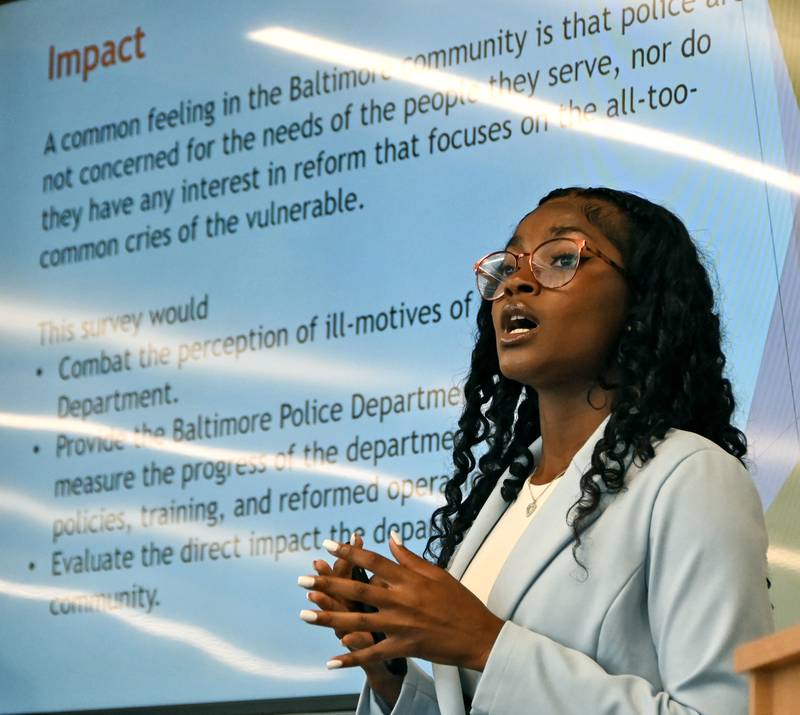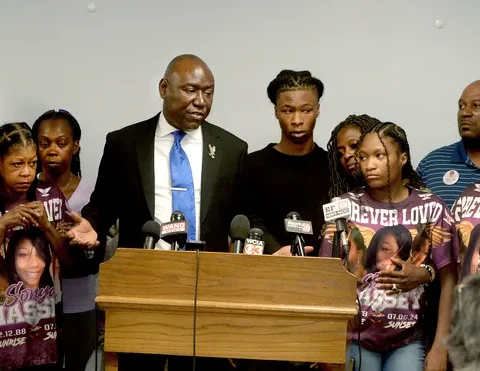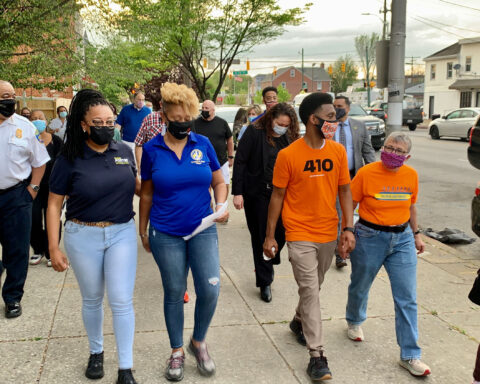By Lea Skene
During an internship with the Baltimore Police Department this summer, Yasmine Bryant met the mother of a city homicide victim struggling with acute grief and growing frustration: Despite repeated attempts to contact detectives about their open investigation, she heard nothing from law enforcement in more than five months.
“Her only child was killed … and she had no updates on the case of her baby boy,” said Bryant, a junior at Morgan State University. “This is a problem.”
At the completion of her 10-week internship, Bryant proposed a solution: Ask victims of Baltimore gun violence how their police department could serve them better. During a capstone presentation Friday morning on the campus of Morgan State, she recommended conducting a survey to help the department strengthen its victim services unit.
Bryant presented her project along with seven other interns who participated in the internship program, which was launched earlier this summer. The Police Executive Research Forum, a Washington-based think tank that sponsored the program, plans to expand it to other cities in the coming months. The interns — students and recent graduates of Coppin State and Morgan State universities — received a $10,000 stipend for their work.
Such partnerships between local law enforcement agencies and historically Black colleges and universities across the country could help address significant challenges facing the future of policing in America, including recruiting more potential officers and strengthening community trust, experts and officials said.
The programs also could present unique opportunities for law enforcement leaders and officers to learn from young people of color, a population whose perspectives are too often overlooked in conversations about policing, said Chuck Wexler, PERF’s executive director.
As for the Baltimore interns, Wexler said, whether they pursue careers in law enforcement or another field, they will remember this summer: learning about the complexities of police work and the daily operations of a major law enforcement agency. The interns were assigned to various sections of the department, including forensics, recruitment, information technology, training, government affairs and victim services.
For the capstone projects, each intern identified a problem and proposed a solution within their focus area. The proposals touched on wide-ranging themes: getting officers to embrace new technologies, recruiting more women and city residents, forging positive connections with underserved youth, and better protecting the department against cyberattacks.
“I have some of the best and brightest in the world working in the Baltimore Police Department, but we’re always moving at 100 mph,” Police Commissioner Michael Harrison told the group Friday. “Your fresh eyes allowed us to see a gap, a hole, something that needs to be improved upon.”
Harrison said the department is striving to become the “greatest comeback story in America” through significant reforms, including some mandated under a federal consent decree imposed in 2017 after a U.S Department of Justice investigation following Freddie Gray’s death from injuries sustained in police custody found a pattern of unconstitutional policing practices.
During a review hearing earlier this week, a federal judge warned the department to remain dedicated to that effort even as rising bloodshed and a deepening manpower shortage threaten to jeopardize existing progress.
Bryant, who recommended the survey of gun violence victims, cited a recently released report that found Baltimore police officers routinely treat victims poorly, sometimes making them feel dehumanized and abandoned or cast aside — especially Black men and youth. Improving that relationship is key to restoring public trust, Bryant said during her presentation.
“The best way to figure out what people need is to ask them,” she said.
She said the survey findings could help fine-tune the relationship between detectives and victim services coordinators — two overworked units whose workloads have only increased in recent months.
A political science major, Bryant said she wants to earn an advanced degree after college and then work in law enforcement, maybe investigating child sex trafficking for the FBI or helping domestic violence victims.
For her presentation Friday, she wore a tailored light blue suit; her winged eyeliner was flawless behind metal-rimmed glasses. She spoke passionately about the public service aspects of law enforcement and the importance of treating crime victims with dignity and respect.
Dana Petersen Moore, chief equity officer for the City of Baltimore, said the project addressed real concerns among residents who experience a lack of communication from police. She said she believed the survey could be implemented.
Last week, Baltimore officials announced new efforts to expand victim services and train more officers on trauma-informed care. They also pledged to better address the trauma experienced by officers themselves, who often struggle to cope with the constant drumbeat of violence in a city where shootings and homicides occur on a daily basis.
Other capstone projects focused on improving internal operations of the department.
Interns Kayla Key and Jasmine Slide, both assigned to the evidence management unit because of their interest in forensics, suggested the department start requiring officers to catalog evidence digitally instead of by hand. They said bad handwriting, spelling errors and incorrect punctuation can create a number of issues and ultimately hinder prosecutions.
“There are some individuals in jail right now due to inaccurate information on the paper form,” Slide said. Meanwhile, the digital forms are readily available.
After their presentation, Deputy Commissioner Eric Melancon laughingly bemoaned the traditional carbon copy forms and asked for recommendations on convincing the more reticent officers to switch to digital. Key and Slide suggested additional training to demonstrate how easy the process is.
During his presentation, intern Cheikh McKissic, who worked in the recruitment unit, said the department should streamline its record-keeping system for applications and background materials. That would allow for better data analysis of potential candidates as the department seeks to attract more women and Baltimore city residents.
De’Shawndra McDonald, a criminal justice major at Coppin State, studied potential solutions to a recent problem in Baltimore: people jumping the fences of public pools after hours. She suggested city officials consider extending pool hours into the evening, investing more in indoor pools and boosting efforts to recruit young people to become lifeguards.
Overall, she said, the police department should partner with other city agencies to create more recreational opportunities.
Albert Johnson, who recently graduated from Coppin State and expressed a strong interest in becoming a police officer, focused his internship on the recently launched Group Violence Reduction Strategy, a program that targets people most likely to become involved in gun crimes — either as shooters or victims — and offers them intensive services. Johnson noticed the program, which was implemented early this year in the Western District, doesn’t include women.
He suggested expanding the program and offering more support for women getting released from prison. He said the lack of resources became especially apparent to him because two of his aunts recently came home after being incarcerated.
Though highly receptive to the recommendations from their interns, Baltimore Police Department leaders alluded to one particular barrier that often arises in discussions about modernizing the agency: money.
Nonetheless, Harrison promised to keep the interns updated as their ideas are considered.





